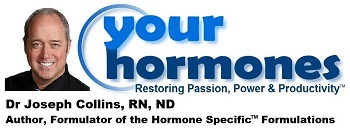
Polycystic Ovary Syndrome Protocol
The hormone imbalances associated with polycystic ovary syndrome (PCOS), PCO-like syndrome and other androgen excess conditions in women include primarily androgen excess and low progesterone, but very can often also include hypothyroidism and insulin resistance, which affects blood sugar.
There are additional imbalances and risk factors that are fairly common in these conditions. These include acne, aggression, alopecia, cancer risk, hirsutism, hyperlipidemia, hypertension, hypoprogestinemia, hypothyroidism, inflammation, insulin resistance, increased oxidative stress (need more antioxidants) & increased risk for preeclampsia. Some of these are due to the hormone imbalances, but some are due to other biochemical imbalances common in PCOS and PCO-like syndrome. For more detail on these metabolic imbalances, please see the article; PCOS, PCO-like Syndrome.
An increased risk and probability of having PCOS, PCO-like syndrome or other androgen excess condition in women can be made through the use of questionnaires, and/or lab tests. A diagnosis can only be made by a licensed healthcare professional. The Hormone Health Guidelines provide a detailed description on how the get the best results from protocols.
Foundations of Health
Foundations of hormone health include lifestyle and dietary choices that support optimal hormone function, a high grade multiple vitamin-mineral formulation, essential fatty acids rich in docosahexaenoic acid and eicosapentaenoic acid, and a high grade multiple species probiotic to support optimal health of digestive system and immune system. To learn more about the foundations of hormone health, please see the Hormone Health Guidelines series of articles.
Primary Hormone Health Formulations
Hormone health formulations indicated for PCOS, PCO-like syndrome or other androgen excess condition in women include:
- TestoQuench™ for Women, a synergistic formulation of phytoantiandrogens designed to restore healthy hormone balance by calming and supporting the ideal function of testosterone sensitive tissues as needed in women with androgen excess. This is the most important formulation that should be used for PCOS, PCO-like syndrome or other androgen excess condition in women.
- ProgestoMend™ can increase progesterone production and function by improving the function progesterone producing tissue, and the function of tissues that respond to progesterone. The progestogenic properties of this formulation can help offset androgen excess in PCOS, PCO-like syndrome or other androgen excess condition in women.
Significant clinical improvement should occur within the first month of using formulations when foundational therapies are used concurrently. Please review Customized Dosing Guidelines for the protocols on weaning, determining maintenance dosage and addressing residual symptoms. The Primary Hormone Health Formulations should be taken at least three months after symptoms are under control before attempting to wean down to maintenance dosage.
Secondary Hormone Health Formulations
- Glucobrium™ is a synergistic formulation of phytotherapeutic extracts which mimic and potentiate the actions of insulin and support healthy blood glucose function. The formulation assists in the normal regeneration and repair of healthy pancreatic beta cells, which is important because pancreatic beta-cell dysfunction is a common finding in PCOS & PCO-like syndrome, especially if there is family history of diabetes.
- ThyroMend™ is a synergistic combination that supports the health of thyroid hormone producing tissues and the healthy function of tissues that respond to thyroid hormones.
Hormone Precursors & Bioidentical Hormone Replacement Therapy
The hormone precursor pregnenolone may be cautiously considered for PCOS, PCO-like syndrome and other androgen excess conditions in women, with caution because they may increase testosterone or other androgens. If they are used to help support adrenal function – or to try pregnenolone to raise progesterone - it is very important that estrogen, progesterone and testosterone levels (especially testosterone) all be monitored, because hormone precursors can affect the levels of each of those hormones.
Hormone precursors can be tried after three months of Foundations of Health and Hormone Health Formulations as indicated, so that hormone metabolism pathways are at their best health.
Even though they are commonly referred to as “hormone precursors”, these supplements (1) may or may not be converted to more potent hormones such as progesterone, testosterone or estradiol, and (2) even if they are not converted, they still have actions of their own. Sometimes these supplements are used with BHRT to get better results. If hormone precursors are going to be used, please see the guidelines for Proper Use of Hormone Precursors.
After trying Hormone Precursors for a month, and if hormone precursors are not enough to restore normal hormone levels and normal hormone function, and relieve symptoms, then Bioidentical Hormone Replacement Therapy (BHRT) is an appropriate decision.
Bioidentical hormone replacement therapies (BHRT) with progesterone may be appropriate, but as with pregnenolone, it should be monitored closely to make sure that it does not increase testosterone, DHEA or other androgens. Hormone Health Formulations and Foundations of Health should still be used with bioidentical hormone replacement therapies (BHRT) to improve the function of the BHRT and the response of tissues to the BHRT. By using the formulations with BHRT healthcare professionals prescribing the BHRT notice that they are able to prescribe lower dosages of BHRT, and women are having a much better response to the BHRT prescriptions. If BHRT is used, please review the series of articles on Bio-identical Hormone Replacement Therapy.
It is also important to take at least a low dosage of Hormone Health Formulations while taking BHRT because BHRT does not fully support the hormone production pathways, but instead provides “replacement”, which may further diminish endogenous hormone production. Hormone Health Formulations also maintain proper tissue response to the BHRT and decrease the development of hormone resistance.
Before using this protocol, be sure to study the article; PCOS, PCO-like Syndrome. Also, please sign up for the free Your Hormones Newsletter (below) to stay informed of the upcoming developments in our ongoing work on the assessment and management of Premenstrual Syndrome & Premenstrual Dysphoric Disorder.
